Whatcha Reading, Reading Through It?
Every week we ask an interesting figure what they're digging into. Have ideas who we should reach out to? Let it fly: info@seattlereviewofbooks.com. Want to read more? Check out the archives.
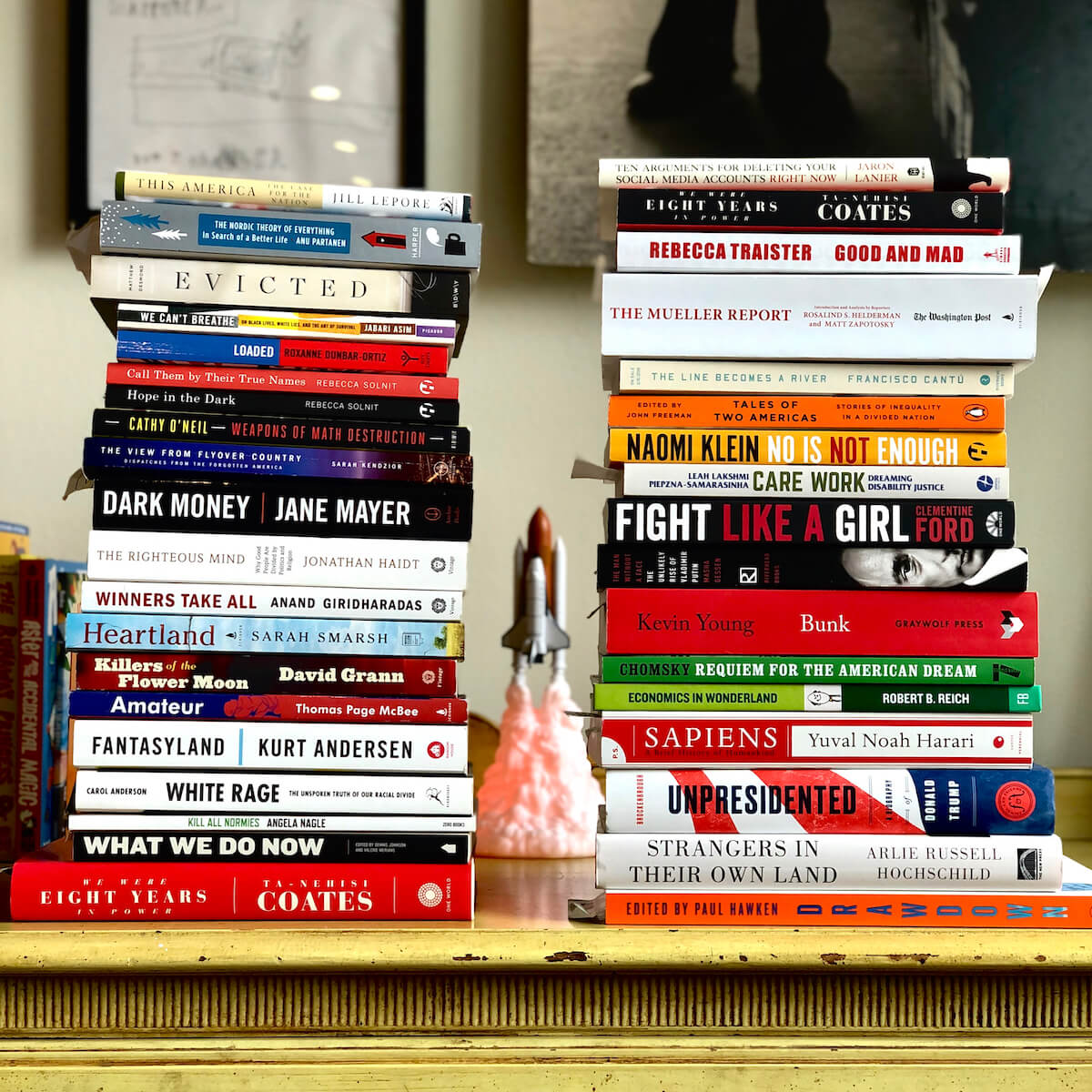
Reading Through It is the book club that the Seattle Review of Books started in 2016 directly after the election of Donald Trump to president of the United States. We started it with Mark Baumgarten, then of the Seattle Weekly, and parterned with Third Place Books in Seward Park. Last week was the final Reading Through It lead by the Seattle Review of Books, but the group will continue under the leadership of the wonderful South Seattle Emerald.
For over three years, over 40 books, we tried to understand the cultural moment that lead us to elect such an incompentent, boorish, narcissistic, racist, unprepared and underserving man to lead our country. We covered racism, class, technology, environmentalism, sexism, hoaxes, economics, trans issues, and sociology. Did we learn? I did. I can't say we ever squared the circle, but we sure did a lot of filing on it. I want to thank everybody who came and talked, and sought answers with us. There were some startling good discussions, laughs, and every month, community. That was one way we found to fight back.
What did you read last?
2016
December: Hillbilly Elegy, by JD Vance.
Here's the wrap-up (look at that photo of everybody who showed up!), and here's our review: Being uncomfortable with the privilege you are draped in on doesn’t make the cloth any less luxurious."
2017
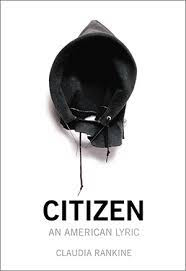
January: Citizen: An American Lyric, by Claudia Rankine.
Her's our preview of the evening. "Claudia Rankine’s book Citizen: An American Lyric first caught America’s attention when a young African-American women named Johari Osayi Idusuyi read it at a Trump rally in late 2015. Idusuyi, who was seated directly behind Trump in a video feed of the rally, pulled out Citizen and started reading it after she realized exactly the kind of event she had attended."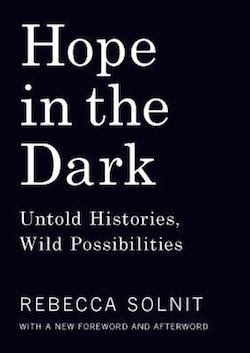
February: Hope in the Dark, by Rebecca Solnit.
Here's a preview of the evening, and here's our review. "But there’s something banal about Bush when compared to Donald Trump. Bush was just the mediocre son of a president who accidentally rose to power. Trump, at this early date in his presidency, is at best a chaos agent and at worst a complete and utter moron. He could likely be a Russian puppet. He is unfit to be president on multiple levels, and he has surrounded himself with white supremacists who seem eager to actively tear down America as an institution. While we’ve had incompetent presidents before, we’ve never seen anything like Trump. At some points, reading Hope in the Dark feels almost like a reminder of a more innocent time."March: Strangers in Their Own Land, by Arlie Russell Hochschild.
Here's our review. "I’ve always wondered why Republicans vote so clearly against their own interests — why people from poor states vote to diminish the safety net until it’s barely a cobweb, why cities that desperately need infrastructure and education reform vote to slash taxes on the wealthy. I could never figure out their motivation, and that always bothered me."The book also made an appearance in a Lunch Date column.
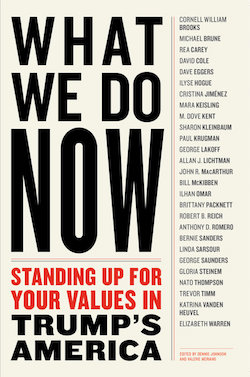
April: What We Do Now: Standing Up for Your Values in Trump’s America, edited by Dennis Johnson and Valerie Merians.
Here's our wrap-up. "This is not to say that the current situation is not grim. As book club attendees pointed out last night, Trump’s policies are causing incredible damage to foreign relations, to the environment, to the very idea of truth. But perhaps the realization that Trump is an inept and hateful president is at least a little more comforting than the pre-inauguration fear that Trump was a brilliant and hateful president. He can still cause a lot of damage — he can still destroy the world, even – but he is not a planner, and he is not a rational thinker. An identifiable challenge is always preferable to an unknown challenge."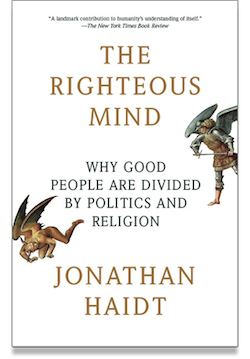
May: The Righteous Mind: Why Good People Are Divided By Politics and Religion, by Jonathan Haidt.
Here's our wrap-up. "But the thing is, The Righteous Mind is an incredibly difficult book to discuss. Haidt digs deep into theories of division and supposition and morality. With remarkable clarity, he explains why we believe what we believe. But when I try to explain what Haidt proves in the book, I’m left repeating bland platitudes: You must find common ground in order to bridge political gaps. Our beliefs aren’t constructed solely on logic. We place ourselves in ideological bubbles, and we use confirmation bias to “prove” our beliefs to ourselves."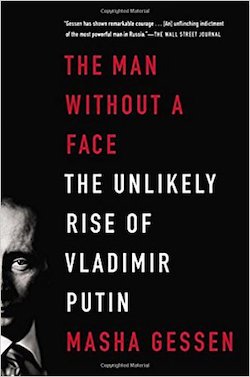
June: The Man Without a Face: The Unlikely Rise of Vladimir Putin, by Masha Gessen.
Here's our wrap-up. "But it’s highly unlikely that Putin expected Trump to win the presidency, and it’s very likely that now Trump is president, Putin is improvising and trying to make as much trouble as possible. In this scenario, Trump is still an unwitting pawn, but Putin is just as flabbergasted and confused as the rest of us as he tries to navigate this new world he unwittingly helped to create."July: Dark Money: The Hidden History of the Billionaires Behind the Rise of the Radical Right, by Jane Mayer.
Here's our review. "For all the hundreds of billions they’ve spent in their efforts to not pay taxes, all the Koches have really won is a slowing of the clock of progress. Their goal is to turn time back to the 1950s, to destroy the progress made by people of color and women and minorities. Really, though, all they can do is stall for a while before they’re outnumbered yet again."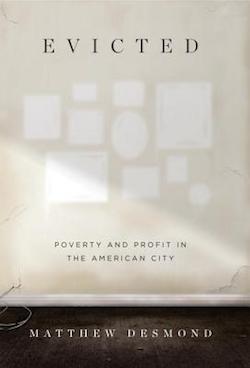
August: Evicted: Poverty and Profit in the American City, by Matthew Desmond.
Here's our wrap-up. "Aside from the refreshing lack of Donald Trump talk, I most enjoyed how the conversation about Evicted was rooted in local current events. We discussed Seattle’s checkered history with low-income housing and the city’s inadequate response to homelessness and rent spikes. Most of us agreed that the answer was not to simply stick ugly low-income housing off in a corner of the city, but to incorporate housing into all parts of Seattle, to create a city where poor and rich live side-by-side, so they can better understand each other."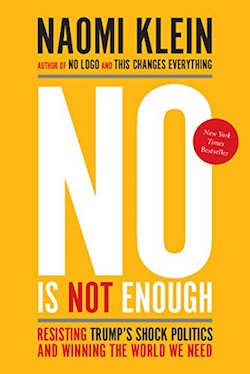
September: No Is Not Enough: Resisting Trump’s Shock Politics and Winning the World We Need, by Naomi Klein.
Here's our wrap-up. "In fact, the book club’s discussion of No Is Not Enough seemed to come from two diametrically opposed poles. Some folks thought that Democrats needed to encourage a slate of big, bold policies like free college and universal health care in order to win votes. Others thought that Democrats would have to be much more pragmatic to win. Some were uneasy with Klein’s full-throated support of Bernie Sanders. Others argued that Sanders was the only template for future Democratic candidates."October: Requiem for the American Dream: The 10 Principles of Concentration of Wealth & Power, by Noam Chomsky.
Here's our review."Just about everyone at last night’s book club had a complaint about Requiem. Many were upset with the way the book continually referred to the 1950s as a golden age for America, when in fact the comfort of the middle class at that time was constructed on the backs of minorities. I hated the fact that Henry Ford was unapologetically cheered in the book as a positive force for the American worker, when in fact Ford was an anti-Semite and a Nazi sympathizer. Some resented the fact that the book criticized contemporary political economy without offering solid solutions."November: White Rage: The Unspoken Truth of Our Racial Divide, by Carol Anderson.
Here's our review. "I tried to explain the ignorance of my white upbringing with a story: I had friends who, three years ago, earnestly asked “why are police officers shooting so many black people all of a sudden?” It never occurred to them that they were just now hearing of an ongoing epidemic because social media made those voices impossible to ignore; as far as they knew, this rash of shootings had never existed before they heard of it. They never could’ve guessed it from the media and the culture that they had consumed their entire lives. "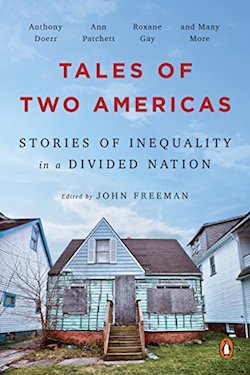
December: Tales of Two America, edited by John Freeman.
Here's our wrap-up. "People talked a lot about feeling hopeless. And that’s to be expected — this first year of Trump’s presidency, with Congress and the Supreme Court tilted in his favor, was bound to make us feel powerless. But at the end of this year, as we tilt into 2018 and its midterm elections, we have to shake off that feeling of powerlessness and embrace our own capacity for change."
2018

January: Weapons of Math Destruction, by Cathy O’Neil.
Here's our wrap-up. "So for the record, an algorithm is just a process — often a tedious repetition of a formula — that plays out in a fraction of a second. It’s often used as a filter, or an interpreter, or a solution to a problem. But like any tool, algorithms can be used for good and bad purposes. And algorithms are always the creation of humans, and they always contain some very human flaws."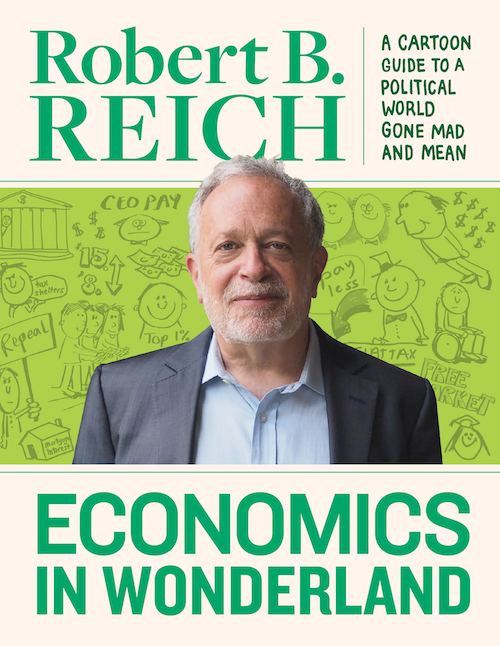
February: Economics in Wonderland, by Robert B Reich.
Here's our wrap-up. "Speaking as someone who has interviewed Reich and reviewed many of his books, I think some of those complaints miss the mark. Reich is interested in building an economic vocabulary for progressives, to give them an array of cohesive ideas through which they can understand and explain the world. He’s an educator first — his preferred title is “Professor Reich,” not “Secretary Reich” — and not a journalist. He is a gifted lecturer and a top-tier economic thinker, and he’s devoting his talents to explaining middle-out economics to a broad audience."March: Janesville: an American Story, by Amy Goldstein.
Here's our wrap-up, and here's our review. "Janesville stars men and women from every one of Janesville’s myriad economic layers. Some of the laid-off factory workers have the resources to find new work. Others grab onto any job they can, because their lives literally depend on it. Teenagers plan for a future that is more tenuous than expected. Paul Ryan is a character in this book — his time as Mitt Romney’s running mate in the 2012 election earns special attention — and his concern for the citizens of Janesville feels earnest and real. Not all of these people will survive until the end of the book. All of them will be profoundly changed. "April: Kill All Normies: Online Culture Wars from 4Chan and Tumblr to Trump and the Alt-Right, by Angela Nagle.
Here's our wrap-up. "But are the men who call themselves men’s rights activists and gamergaters and white separatists online really “transgressive?” If you take them at their word, in fact, they’re regressive: they want to return to what they imagine to be the glory days in America, when white men were at the top of the pyramid and everybody else was considered to be a second- or third-class citizen. "May: The Line Becomes a River.
Here's our wrap-up, and here's our review. "He’s trying to get good at his job, he tells his mother. He’ll figure out what it means later, he insists. But his dreams are trying to tell him what it means now. A wolf haunts his sleep with the threat of impending violence. He is grinding his teeth to bits. He is anxious from lack of sleep. After one particularly violent dream, he realizes he must make peace with the wolf, and he addresses him as “brother.” "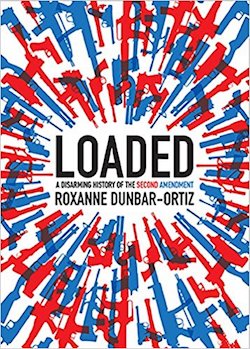
June: Loaded: A Disarming History of the Second Amendment, by Roxanne Dunbar-Ortiz.
Here's our wrap-up. "But even those who disagreed with Dunbar-Ortiz’s methodology agreed with many of her conclusions. Gun culture in the US simply is different than everywhere else, and it’s really remarkable how many of the institutions we simply assumed always existed are fairly new inventions. (The concept of a police force, for instance, is much newer than most people think.)"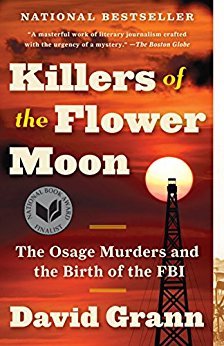
July: Killers of the Flower Moon, by David Grann.
Here's our wrap-up. "Members of the Reading Through It Book Club had a lot of great insights about how Killers relates to our modern era — particularly in the methods that white looters used to attack the Osage. The grifters and murderers understood instinctually that the way to attack and to dehumanize a people is by breaking their families to pieces. These are the same methods that the Trump administration is using on the border today: they’re targeting an entire culture by dividing families and othering them while they are weakened and mourning. "
August: The View From Flyover Country, by Sarah Kendzior.
Here's our wrap-up. "As we talked through this member’s concerns, some of the shine came off the book. We agreed that Kendzior tackled serious, important issues lyrically and with great verve and passion, but if she had offered greater historical context around some of her topics, or perhaps had framed this collection more as essays than journalism, it could have preempted some of the holes in her arguments. "
September: Fantasyland: How America Went Haywire, by Kurt Andersen.
Here's our review. "I would have appreciated if Fantasyland touched more on the systemic causes of these mass delusions. Economics and demographics have no place in this book. Andersen’s tirades about the increase of LARPing and video games among adults, for instance, ignore the increase in disposable income among American adults, or the decrease in birth rates, or the increase in four-year college attendance, or any of the thousand other factors that led to the proliferation of renaissance faires in America. Instead, he cites the increased neediness of American adults as just another piece of flotsam in the river of American delusion, no different than the rise of anti-vaccination protesters. "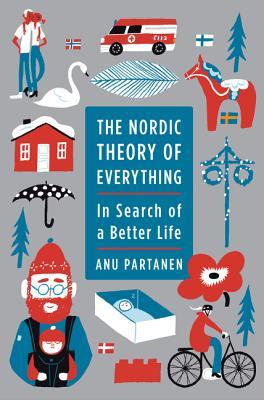
October: The Nordic Theory of Everything, by Anu Partanen.
Here's our wrap-up. "Our conversation at the book club last night veered toward the cynical. We had a big discussion over whether one person’s actions — particularly in an overwhelmingly liberal city like Seattle — can make a difference in the country. Every time we talked about the possibility of choosing a better system, an ugly truth would rear its head. "
November: Sapiens: A Brief History of Humankind., by Yuval Noah Harari.
Here's our wrap-up. "Along those lines, one big takeaway from the book was the way Harari tries to demythologize the human race. We are not the end result of millions of years of evolution, nor are we the pinnacle of life on earth. But the very thing that makes us special — our ability to cooperate through shared communication and stories — also convinces us of our own supremacy as a species. We are gods in our own minds, Harari argues, and he implies that it might be best if we let go of that arrogant assumption. "
December: Call Them by Their True Names, by Rebecca Solnit.
Here's our wrap-up. "'Patriarchy unbuttoned' is a pretty great turn of phrase for the current moment, with Kavanaugh bellowing and Lindsay Graham shrieking and basement warriors everywhere whining about men’s rights. It’s two words that distill everything, a pure display of Solnit’s power. "
2019
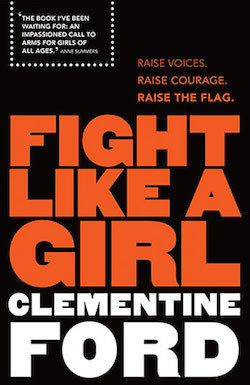
January: Fight Like a Girl, by Clementine Ford.
There was no wrap-up for this book.
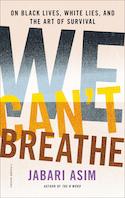
February: We Can’t Breathe: On Black Lives, White Lies, and the Art of Survival, by Jabari Asim.
Here's our wrap-up. "There was much to discuss in Asim’s book. The essays are not just gorgeously written; Asim placed them perfectly in relation to each other. The first essay is about the importance of truth and the lies people tell; it immediately framed Asim as someone who cares deeply about honesty. The second essay is about the pleasures of strutting, of feeling comfortable and happy in your own body, and the joy that Asim takes in lyrically describing his own tendency to strut is infectious. "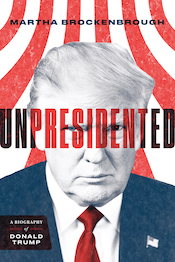
March: Unpresidented, by Martha Brockenbrough. Martha was kind enough to join us for this discussion.
Here's our interview with her from before the group met. "But if you look at it another way, not a lot of stuff has changed with Trump — not since he was a little boy writing poems about winning at baseball and loving the cheers of crowds. I wanted to set up patterns: his father’s business practices, his business practices, his grandfather. I wanted to identify the patterns and see what those told me about Trump and the things that drive him. Once you do that and identify the fact that here’s a guy who’s long been entangled with Russia, here’s a guy who’s long broken the law and cut corners with business — once you establish those patterns, then all the breaking news headlines are frankly more of the same. "
April: Care Work: Dreaming Disability Justice, by Leah Lakshmi Piepzna-Samarasinha.
Here's our wrap-up. "Many members of our book club felt overwhelmed by Care Work. That’s understandable — the book is a collection of essays intended for a few different audiences — in one piece, Piepzna-Samarasinha is talking directly to other disabled activists, in another she’s aimed at a more general audience. Someone at the book club said that Care Work was the equivalent of taking a 301-level course without taking the 101-level first. "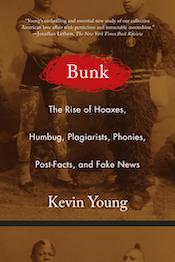
May: Bunk: The Rise of Hoaxes, Humbug, Plagiarists, Phonies, Post-Facts, and Fake News, by Kevin Young.
Here's our wrap-up. "One of the best observations at last night’s book club was the recognition that a simple lie isn’t enough to make something a hoax. It’s not enough to spread falsehoods to make a true hoax: you have to generate a mistrust in the truth, too. By creating an atmosphere in which everything could be false, the most confident liar gets to dictate the reality. It worked for Barnum, and it has worked thus far for Donald Trump. "
June: The Mueller Report.
Here's our wrap-up. "As the world saw in his quietly outraged public appearance last month, Mueller has a profound sense of right and wrong, but even his G-Man morality is nothing compared to his devotion to the law. Mueller announced that he could not indict a sitting president, and that he would have cleared the president of indictable offenses if he could. The inference, of course, is that President Trump committed indictable offenses, but Mueller is bound by duty to not say that out loud. "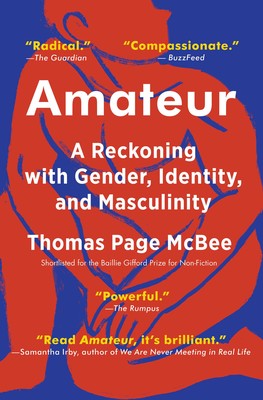
July: Amateur: A Reckoning with Gender, Identity, and Masculinity, by Thomas Page McBee.
There was no wrap-up for this book.
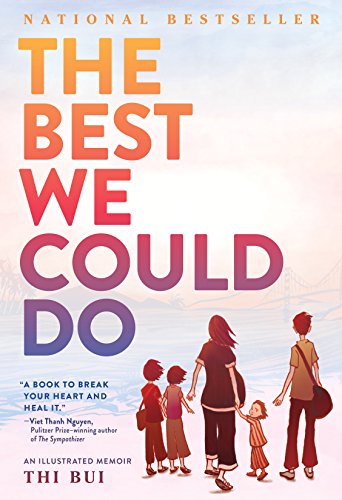
August: The Best We Could Do, by Thi Bui.
Here's our wrap-up, and here's our review "Best is a refugee story, a story of war and suffering and hope. Bui narrates as her family flees Vietnam and makes their way to America. Her parents aren’t heroes — her father is a downright cruel parent, subjecting his kids to fear and confusion. But Bui’s compassion for him allows her to find a path toward, if not acceptance, then at least understanding. "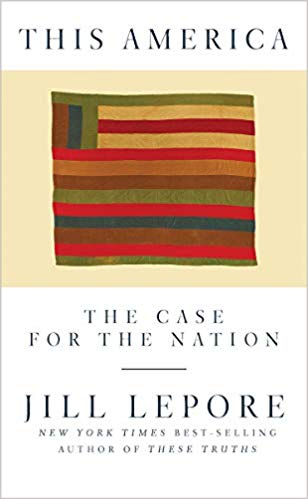
September: This America: The Case for the Nation, by Jill Lapore.
Here's our wrap-up. "But patriotism used as a weapon isn’t true patriotism. Unlike the hatred of nationalism, patriotism is a positive force — a common understanding of who we are and where we’re going. Is it even possible to bring together Americans under the guise of patriotism anymore? Would a reinstatement of a robust civics curriculum help, or perhaps two years of mandatory community service for all young Americans? Is there any way to restore something we can all experience in these hyper-personalized times? "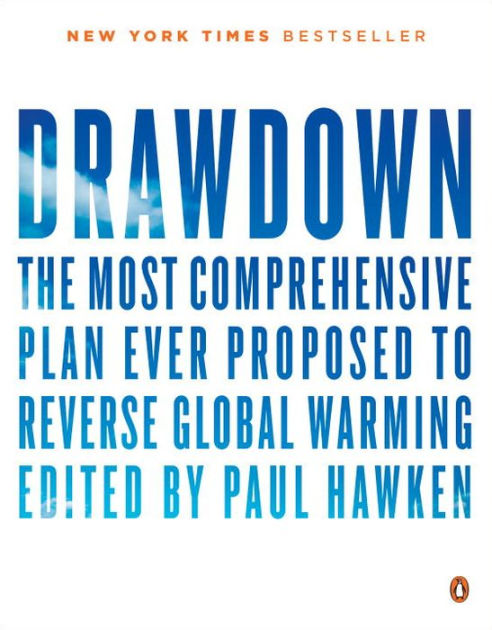
October: Drawdown: The most Comprehensive Plan Ever Proposed To Reverse Global Warming, edited by Paul Hawken.
Here's our wrap-up. "One of the most interesting avenues of discussion had to do with the way that the book centered white men — it’s edited by a man, and it features essays largely by men, and the chapter on how policies benefitting women could help the environment mostly consisted of reproductive rights, as though bearing children is the only value women possess. Thunberg has helped decentralize the conversation from a masculine frame, and so Drawdown already feels regressive, though it was only published last year. "
November: Heartland: A Memoir of Working Hard and Being Broke in the Richest Country on Earth, by Sarah Smarsh.
Here's our wrap-up, and here's our review. "This is the book you wished Hillbilly Elegy could have been. Smarsh remembers her poor upbringing with a delicious, wistful ache. The book is not dipped in nostalgia, and it’s not playing up the poorest Americans as pure-blooded saints, either. It’s a canny observation of the way that macro-level systems can affect the tiniest portions of our lives — often without our even noticing. "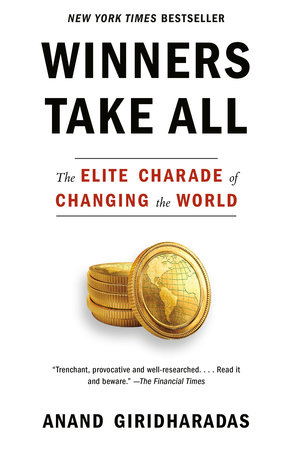
December: Winners Take All: The Elite Charade of Changing the World, by Anand Giridharadas.
Here's our wrap-up, and here's our review. "As robust as Winners Take All may be, it seems only the tip of the iceberg. By book’s end, it was clear that Winners Take All offered just a glimpse into the influence of market-driven approaches to solving societal problems. Giridharadas claims to be something of a reformed MarketWorld participant, a born-again public servant perhaps. But I wonder which topics he excluded from the book, intentionally or not, courtesy of his own proximity to the subject. "
2020
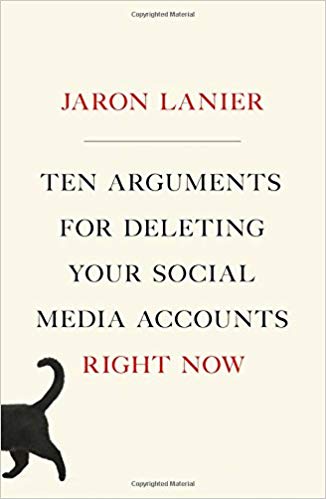
January: Ten Arguments for Deleting Your Social Media Accounts Right Now, by Jaron Lanier.
Here's our wrap-up. "You’ve likely heard many of the arguments against social media, and you likely still use social media. Maybe you feel guilty about it. Perhaps you recall a time when you were off social media and you felt more relaxed and engaged and generally happier, but you still find yourself numbly refreshing your feeds, desperately looking for something new. The mechanics of this are simple meat and chemistry: the dopamine hits, the fear of missing out, the boredom of waiting in line at the grocery store. "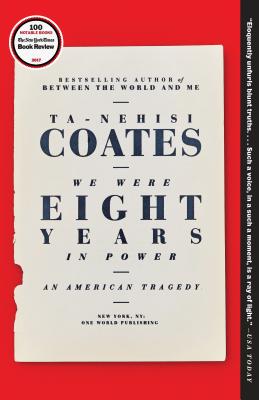
February: We Were Eight Years in Power, by Ta-Nehisi Coates.
Here's our wrap-up, and here's our review. "The absence of the grand imitation-Baldwin gesture in Coates’s personal reflections make him an organic, fluid character in Eight Years in Power, one with the right voice to tell the complex story of Barack Obama’s presidency and Coates’s (and so many people in Black America’s) failed waltz with the idea that America might be better than its grievous sins. For Coates, a hardscrabble wit from the streets of Baltimore, the reverie is short lived. Yet throughout the book, he doesn’t discount it, or Obama’s power or meaning to black people and the price they and he paid for Believing in White America far, far more than white America wanted to believe in them. "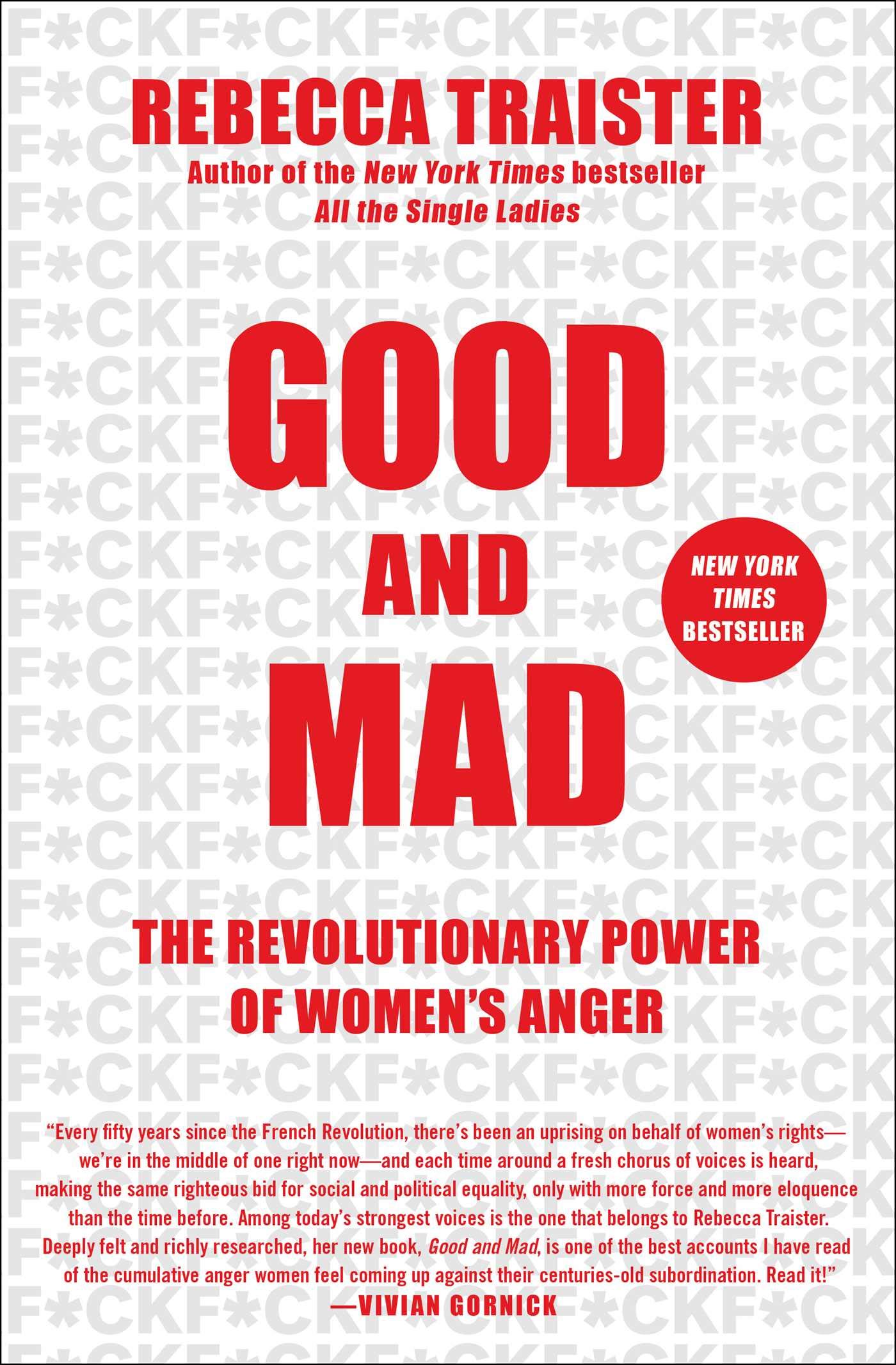
March: Good and Mad: the Revolutionary Power of Women's Anger, by Rebecca Traister.
Here's our wrap-up. "We talked with admiration for Traister’s remarkable book — Good and Mad rushed out of her in a handful of months, accompanied by a wave of catharsis that easily spreads to readers — and its many epiphanies. We discussed how the book ably identified the schism between white women and those who don’t enjoy the same privilege as white women — women of color, LGBTQ women, disabled women. We talked about what it means to relax into your anger, and how that’s freeing; that women who learn how to be okay with their anger do not broaden into a lifetime of anger. Instead, when you learn how to be angry in a healthy way, it removes anger from your life. "
What are you reading next?
Next month, the South Seattle Emerald takes over hosting duties; their first Reading Through It title is Ibram X. Kendi’s How to Be an Antiracist, although please check in with Third Place Books to see if the group will go on, given the current social distancing due to coronavirus.